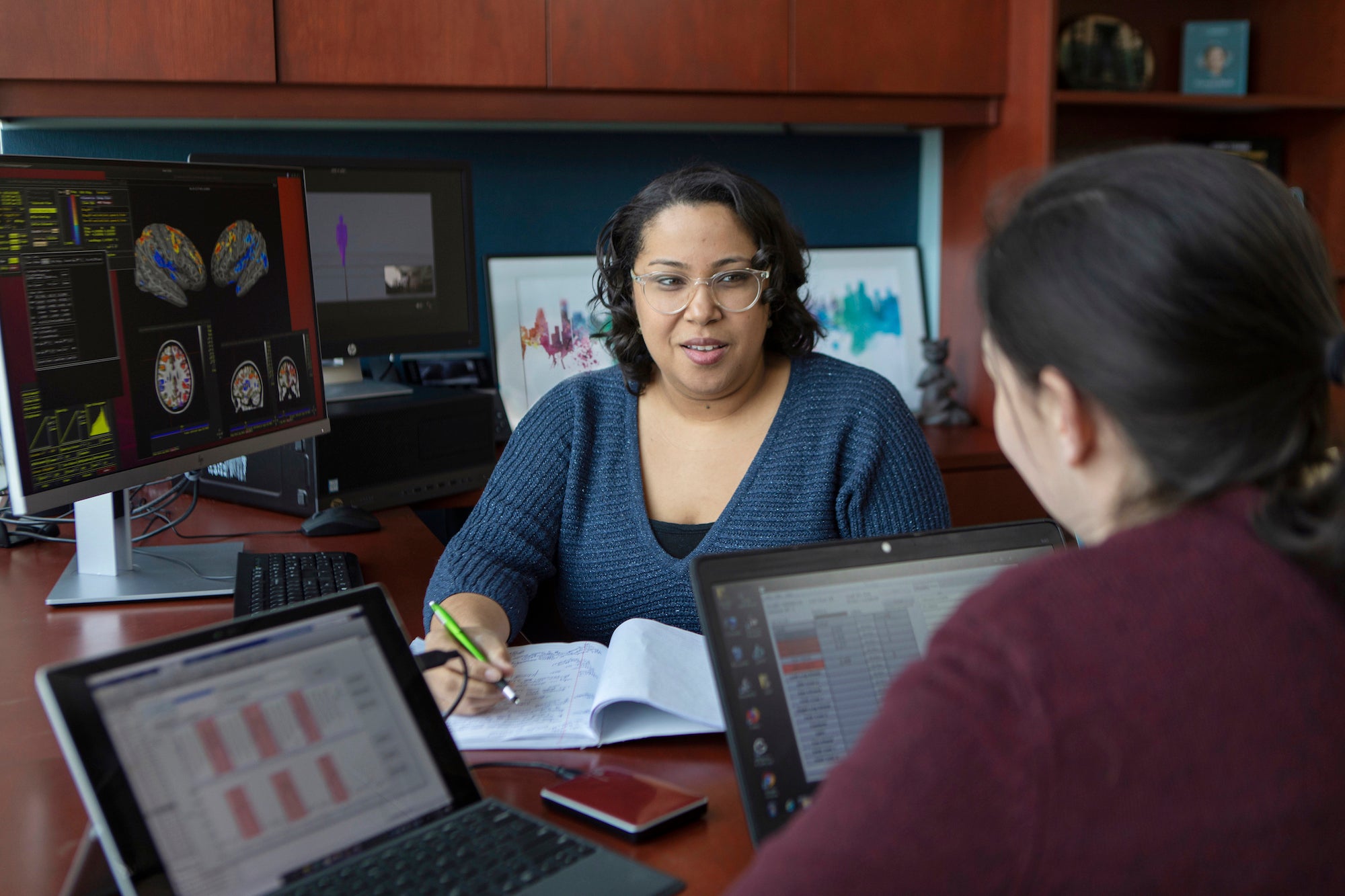News & Highlights
Topics: Awards and Achievements, Clinical & Translational Research, Education & Training, Five Questions
Five Questions With . . . Victoria Poole
Victoria Poole, who completed Harvard Catalyst's C/T Research Academy and KL2/Catalyst Medical Research Investigator Training, shares how our training programs have helped advance her career and the research that led to her recent award from STAT News.

Victoria Poole, PhD, was a postdoctoral fellow in the Harvard Translational Research in Aging T32 program from 2014 to 2016. She credits several Harvard Catalyst programs for helping direct her career. Now, with a NIH career development award, she is back in her hometown of Chicago, pursuing a joint research project with Rush Alzheimer’s Disease Center and Hebrew SeniorLife’s Marcus Institute for Aging Research. She was named a 2019 STAT Wunderkind, one of the brightest young minds in life sciences, by STAT News.
What was your inspiration for pursuing a PhD in biomedical engineering?
It was a few things. First and foremost, my mom. I remember as a young child constantly accompanying my mother to the hospital. She’s had to have several different surgeries over the years after a bad car accident one snowy night in Chicago. But she’s also a big booster of STEM education. She’s retired now from the State Board of Education, but she’s always pushed to incorporate the role of African influences in STEM. She wanted those who are underrepresented to know this history, gravitate towards it, and not be afraid of math, science, technology, and engineering.
But I fell in love with technology for myself in high school. On a whim, I took “Intro to Small Engines” (I figured, anything that a guy could do, I could do better!). It was hard, but I enjoyed it. I took advanced courses, competed in SkillsUSA competitions, and even joined the auto club! Everything came full circle for me when I started learning about things like tele-surgery, robotic prosthetics, and orthopedics. That’s when I realized this was something that I really want to do.
You attended both Harvard Catalyst’s Clinical/Translational Research Academy and the KL2/Catalyst Medical Research Investigator Training. How did they help advance your career?
It was the exact additional training that I needed. The C/T Research Academy was highly recommended and was a great opportunity for me to be immersed in the clinical component, which as a PhD I didn’t have. I’d been characterizing brain activity with MRI, but needed to know how to develop my work so that it reached the clinic. Then when my postdoc was ending, I received a two-year KL2/Catalyst award, which allowed me to study the neural mechanisms surrounding falls in older adults. That program was fantastic too and provided a lot of research, career direction, plus other skills like grant writing.
When I walked away from those Harvard Catalyst opportunities, I left with colleagues, mentors, and an experience that really made me feel like I was part of a team. I now have an NIH K01 career development award, which is providing me with a few more years before independence. The Harvard Catalyst programs gave me the tailwinds to get it.
“When I walked away from those Harvard Catalyst opportunities, I left with colleagues, mentors, and an experience that really made me feel like I was part of a team.”
Talk about the research you’re doing that got the attention of STAT News?
A study called MOBILIZE Boston literally had gone door to door to recruit older adults within the community to study their health and wellbeing. As part of the latest phase of that study, I used MRI to quantify brain structure and function in order to understand how better brain blood flow and brain function are associated with better cognition and mobility.
Many labs focus on dementia, neurocognitive decline, or on movement disorders such as Parkinson’s disease. But very few look at how aging brains are associated with mobility and independence. In order to walk from point A to point B, we have to call on mental faculties like executive function, attention, navigation, and spatial perception. But as we age, our physiological systems also age, which makes getting around much more difficult. At Rush, we’re following older adult mobility within the community by using technologies that can quantify patterns of gait and physical activity.
For the next step, with my NIH funding, I’ll be trying to develop a biomarker to predict future mobility using multimodal MRI, devices, and a person’s clinical information.
What do you want to accomplish when you have your own independent lab?
I want to understand and be an advocate for what matters most as we age. People want to maintain their independence, cognition, and mobility, and our various daily decisions can really influence our future. I’d like to see us unite all of these pieces of information we’re gathering to inform clinical solutions and a better tomorrow for more people.
You have family reasons for being in Chicago now, but can you imagine someday returning to the Harvard family?
I definitely wouldn’t shy away from the idea if the opportunity presented itself. I enjoyed my time, and I have true mentors and colleagues I want to keep in contact with and continue to collaborate with during my career.

